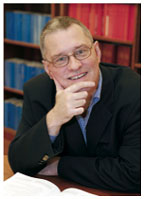
|
|
December 14, 2005: President's Page
THE ALUMNI WEEKLY PROVIDES THESE PAGES TO THE PRESIDENT
Dean of Religious Life Thomas E. Breidenthal |
Religious Life at Princeton
In this season rich in religious traditions, I have invited Dean of Religious Life Thomas E. Breidenthal to reflect on his multifaceted ministry. Since joining our University community in 2002, he has used his wealth of pastoral and theological experience to foster a wide array of religious expression while forging closer social and spiritual ties among people of all faiths. — S.M.T.
Two years ago the Office of Religious Life (ORL) was trying to come up with a logo. We eventually gave up on it, because we could not come up with one image that captured the whole thrust of our work. For one thing, the work is varied, ranging from maintaining a world-class organ and a 90-voice choir to administering Community Action, a week-long community service program for entering freshmen. For another, none of our activities is easily subsumed under a single purpose or confined to a single area of the University’s life.
For instance, the University Chapel is the spiritual center of the campus, but as a place of solemn assembly it also serves the surrounding community, and provides an important link between the University and the town.
Again, although faith and worship inform much of what we do, the scope of the religious expression directly or indirectly sponsored by ORL is very wide. Ecumenical Christian worship happens every Sunday morning in the Chapel, followed by Hallelujah!, a weekly service of worship in the African-American tradition. But we also provide space in Murray-Dodge Hall for Muslim, Hindu, and Buddhist prayer and meditation, and Orthodox, Conservative, and Reform minyanim meet regularly for worship in the Center for Jewish Life. ORL also recognizes and works closely with 16 denominational and non-denominational chaplaincies.
On the other hand, while we do all we can to support religious diversity, we are equally concerned to help all of Princeton’s students to respect religious difference and to navigate it successfully. Thus we pour considerable energy into promoting inter-religious dialogue and providing opportunities for students to gain skill and comfort in raising and discussing questions relating to faith and ethics. For instance, the Religious Life Council, comprising students representing as many of the world’s faith traditions as possible, meets every week to develop and model mutual respect and understanding.
Also, although our programs and gatherings sometimes provide students with a refuge from the rigors of the academy, there are many natural opportunities for us to work closely with faculty to supplement what students are learning in the classroom. For example, at the request of the Woodrow Wilson School, ORL partnered with the Center for the Study of Religion to create and host a panel discussion on the role of faith-based NGOs in the international AIDS crisis.
Finally, while we seek to make religion as visible as possible at Princeton, we are also the home of the Student Volunteers Council, a student-centered community service agency that goes out of its way to be a place where students who do not embrace any religion can feel completely at home.
While these facets of ORL resist consolidation under a single logo, they do, in fact, reflect a single mission. The Office of Religious Life exists to support and promote religious life on campus in all its forms, including those forms that resist being described as religious. Religion is a phenomenon about which it is notoriously difficult to generalize, since there is no such thing as generic religion, and the multiplicity of faiths and traditions defies reduction to a lowest common denominator. Nevertheless, here is a generalization that works for me: Religion means caring about something outside of myself. The religious disposition is nothing other than the willingness to take seriously the claim of the stranger (be that God or another human being), even when that claim is not in my immediate self-interest or the interest of those closest to me.
That is to say, although religion has to do primarily with God, it also has everything to do with how we treat other people. This is how the Epistle of James, which is read every year at Baccalaureate, puts it: “Religion that is pure and undefiled before God, the Father, is this: to care for orphans and widows in their distress, and to keep oneself unstained from the world” (James 1:27).
Considered in this light, religion touches on the deepest roots of the University as an institution dedicated to objectivity in the matter of truth, impartiality in the matter of justice, and regard for the fullness of the person in the matter of admission. Devotion to truth depends on our willingness to put narrow self-interest to one side, as does devotion to fairness and due process. And both these commitments go hand in hand with eagerness to engage with persons and cultures different from our own.
Princeton no longer regards itself as religious in the strict sense,
but it remains profoundly religious in this more general sense. ORL’s
mandate is to keep this aspect of Princeton front and center, not only
by acknowledging the presence of a rich and varied religious community
on campus, but by encouraging and celebrating the love of neighbor that
defines Princeton at its best, and that transcends all religious boundaries
and faiths. ![]()


